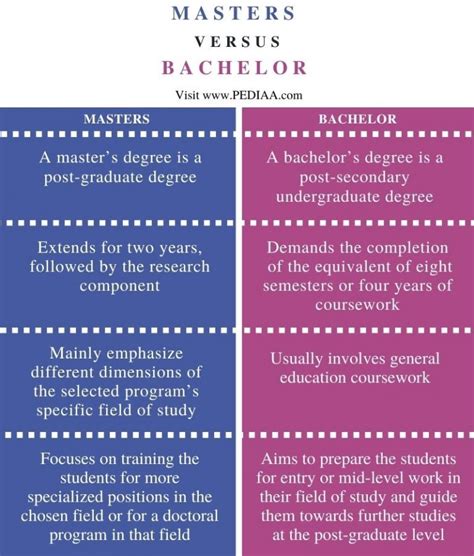The academic journey often presents individuals with a choice between pursuing a master’s degree or stopping at a bachelor’s level. While both degrees hold significant value, understanding the distinctions between them is crucial for making an informed decision.

Earning a Master’s Degree
A master’s degree is an advanced academic qualification typically obtained after completing a bachelor’s program. It involves specialized study in a specific field, often leading to career advancement or higher-level research opportunities. The duration of a master’s program can vary depending on the institution and the field of study, but it typically takes 1-2 years of full-time study.
Benefits of a Master’s Degree:
- Career Advancement: A master’s degree significantly enhances career prospects in many fields, providing access to higher-level positions and specialized roles that often require advanced knowledge and skills.
- Specialized Knowledge: Master’s programs offer in-depth study in a particular field, equipping students with advanced theoretical and practical knowledge essential for success in specialized careers.
- Research Opportunities: For individuals aspiring to pursue academic research or careers in research-intensive fields, a master’s degree serves as a gateway to doctoral programs and opens doors to research projects.
- Increased Earning Potential: Statistics from the U.S. Bureau of Labor Statistics reveal that individuals with master’s degrees earn significantly higher salaries compared to those with only bachelor’s degrees.
Common Mistakes to Avoid:
- Assuming a master’s degree is always necessary: Not all careers require a master’s degree. Evaluate your career goals and determine if a bachelor’s degree is sufficient for your aspirations.
- Pursuing a master’s degree without a clear purpose: Carefully consider your reasons for pursuing a master’s degree. Ensure it aligns with your long-term career objectives.
- Applying to a master’s program without adequate research: Thoroughly research different master’s programs, their curricula, faculty, and reputation before making an application.
FAQs:
-
What is the difference between a master’s and a bachelor’s degree?
– A master’s degree involves advanced study in a specific field after completing a bachelor’s degree, while a bachelor’s degree is a foundational degree in a broader field of study. -
How long does it take to earn a master’s degree?
– The duration of a master’s program typically ranges from 1-2 years of full-time study, depending on the institution and field of study. -
Is a master’s degree worth the cost?
– The financial investment in a master’s degree can be substantial, but the potential for increased earning potential, career advancement, and specialized knowledge often makes it a worthwhile investment. -
Do I need a master’s degree to work in a specific field?
– While some careers may require a master’s degree, it varies depending on the specific field and job role. Research the career requirements thoroughly before making a decision. -
What are the benefits of pursuing a master’s degree?
– Career advancement, specialized knowledge, research opportunities, and increased earning potential are some of the benefits of pursuing a master’s degree. -
What are the common mistakes to avoid when considering a master’s degree?
– Assuming a master’s degree is always necessary, pursuing it without a clear purpose, and applying without adequate research are common mistakes to avoid. -
How can I choose the right master’s program for me?
– Thoroughly research different programs, their curricula, faculty, and reputation. Consider your career goals and the alignment of the program with your aspirations. -
What is the job market like for master’s degree holders?
– The job market for master’s degree holders is generally strong, with increased demand for specialized knowledge and skills in various industries.
